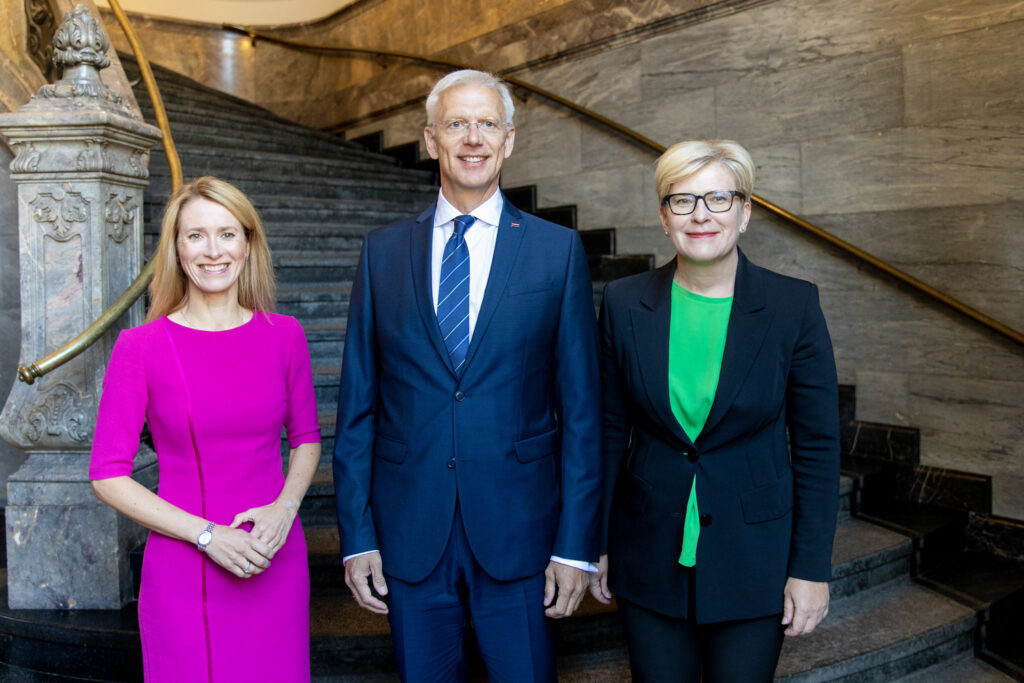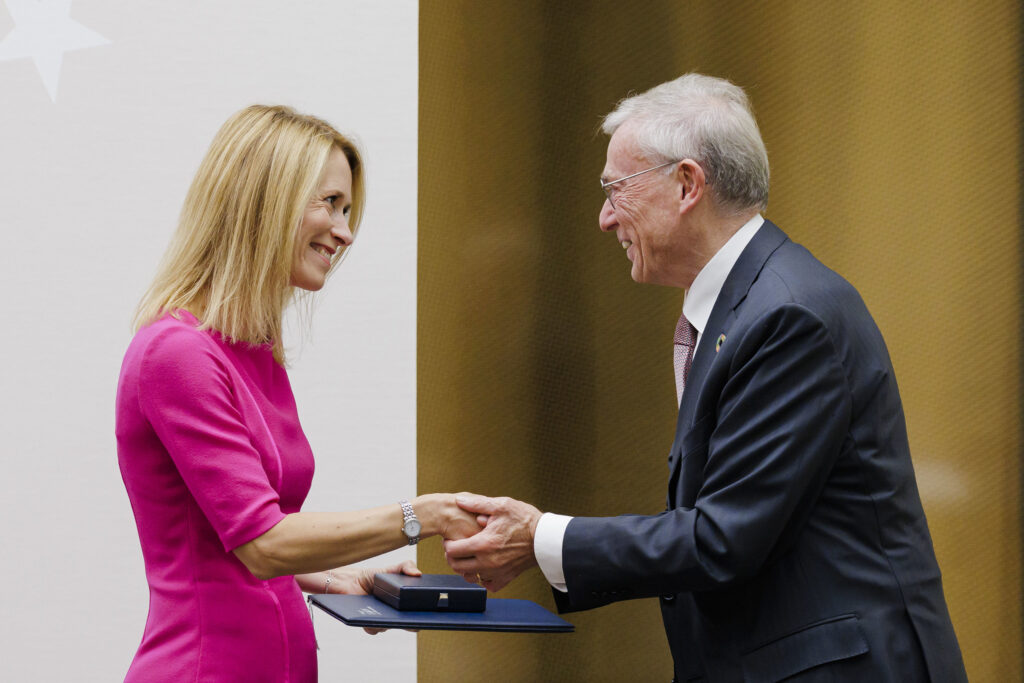Mul oli au võtta Berliinis vastu mainekas Hayeki auhind.
Saime selle koos Läti peaminister Krišjānis Kariņši ja Leedu peaminister Ingrida Šimonytėga “demokraatlike väärtuste kaitsmise ja liberaalse majanduspoliitika elluviimise eest.”
Aitäh selle märkamise eest.

Oma kõnes ütlesin, et Eesti ehitas üles demokraatliku riigi, jälgides muuhulgas ka Hayeki põhimõtteid ning kuulates oma rahvusvaheliste sõprade ja nõuandjate õpetusi. Ehk on nüüd käes aeg, mil kuulatakse meid.

Täispikkuses kõne:
On behalf of Estonia, I am honoured to receive this award, together with Latvian and Lithuanian colleagues, for „defending European democratic values “.
Honestly, I think that this award should be given to my father and his contemporaries as they made the important decisions to build up Estonia as we know today.
I was a teenager when Estonia was re-born after collapse of the Soviet Union. Democratic values have a special meaning to me – my growing up went hand-in-hand with building Estonian democracy.
When we emerged from the totalitarian prison 31 years ago, we had to build a free and open society, from scratch. This was not an easy task – despite relief that people were finally free. Re-establishing a democratic relationship between the citizen and the state is not something you do overnight and it is not something you can simply learn from books.
We started from zero or even sub-zero as the Soviet Union had normalised corruption, there was no rule of law – so-called collective cause always prevailed over individual rights and liberties. This is best illustrated by the fact that during the Soviet occupation we practically only had criminal law as there was no private property – so there were no laws for safeguarding individual rights.
Autocrats do not care for the people, they only care for their power. Last year’s Nobel Peace Prize laureate, Dmitri Muratov called this a question between, and I quote, “people for the state, or the state for the people.”
Life under Soviet occupation shaped the mindset and attitude of our people back then – the state was not ours but theirs – the occupiers’, so it was fine to steal from the state.
Establishing market liberalism and parliamentary democracy demanded a turnaround in attitudes and identity – the state was no longer “theirs” but “ours”. The assets were no longer “theirs” but “ours”. The rights of individuals and the rule of law were placed at the centre of governance. This meant rooting out corruption and building up strong institutions in support of a society and safeguarding individual rights.
We understood from the beginning that rule of law is the foundation of prosperity – if the investors trust your legal system, they are not afraid to invest in your economy.
We have subscribed to these fundamental principles and are proud of all that we have achieved over the past three decades. Since the early 1990s, the average salary in Estonia has increased 45 times, the average pension 60 times. Even adjusted for inflation, our real GDP has increased by around 3,5 times, far faster than in Europe as a whole. As a result, our living standards have rapidly converged towards EU average levels. In the process, we have surpassed several countries of the so-called Old Europe, most recently Spain.
This success is also evident in our very high (often top) position in any number of international rankings, be it concerning freedom, transparency, business environment, digitalization and cybersecurity or the quality of education.
Our progress over the last three decades is due to very many factors. Most critical, of course, is the wish and determination of our citizens to seek a better life and build a better society. The government contributed: over very many electoral cycles it has adhered to principles which were also stressed by Friedrich Hayek, including (1) prudent monetary, fiscal and financial policies; (2) an open market economy which promotes robust competition and free trade, and (3) commitment to the rule of law/anticorruption.
Despite various domestic and external pressures to change, we have remained largely true to these principles, which also became a foundation for our success to date.
Ladies and gentlemen,
Defending European democratic values is as topical as back then – today we defend these values in Ukraine. While being members of the EU and NATO, we are now well positioned to show leadership and take responsibility in defending these principles. You do not need to look hard for parallels with our own state building and the importance of giving support to Ukraine now. Ukraine is under attack because it is a democracy, because it built an open market economy and because it wanted to become part of the rule of law family of the EU.
History gave the states that regained or gained their independence at the end of the Cold War a short window of opportunity. Estonia, Latvia and Lithuania were able to take advantage of it. We do not even want to think about what our situation would be now, had we not become members of NATO and the EU in 2004.
I hesitantly mention a recent comment by Dmitri Medvedev – the top propagandist of the Kremlin regime. And I quote: “The fact that you are free is not your achievement, but rather a failure on our side”. End of quote. I cited it because it captures best what many have discovered only now – while the Soviet Union collapsed, its expansionist colonialist ideology never did. Neither have Russia’s leaders given up their goal of conquering new territories. Ukraine is not the victim of a one-time miscalculation by a madman. We are witnessing a long-planned campaign by the Kremlin to exert control over neighbouring countries by brute force, no matter the human cost.
We within the EU and NATO have a window of opportunity to stop Russian aggression now. The signs of Kremlin´s violent ambitions were there all along. Despite that, many advocated for efforts to engage Russia and take its interests into account. One example is the decision at the NATO Bucharest Summit in 2008 not to grant Ukraine and Georgia a Membership Action Plan – by now it is clear that this was interpreted by Russia as weakness and a clear invitation to establish itself militarily in Europe. Now it is our responsibility to learn the lessons from our past decisions.
We cannot repeat the mistakes we did with our response to aggression in Georgia, Crimea and Donbas where Russia gained territories and was not punished for it. No legal consequences followed.
If we fail to stay strong and push back the aggressor to its territories and prosecute war crimes and crime of aggression the whole international rules-based order is in danger. The price goes up with every delay and every hesitation. Meeting evil halfway is still victory for the evil.
Those sharing the border with the aggressor have a different experience and perspective from those with much better neighbours. While building up our democracy, along the lines of Friedrich August von Hayek’s principles, we were listening to our international friends and advisers. And maybe now is the time to listen to us.
Thank you.
